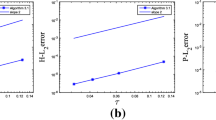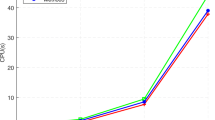Abstract
In this work, we analyze a recently proposed stabilized finite element formulation for the approximation of the resistive magnetohydrodynamics equations. The novelty of this formulation with respect to existing ones is the fact that it always converges to the physical solution, even when it is singular. We have performed a detailed stability and convergence analysis of the formulation in a simplified setting. From the convergence analysis, we infer that a particular type of meshes with a macro-element structure is needed, which can be easily obtained after a straight modification of any original mesh.




Similar content being viewed by others
Notes
In any case, we can always project the continuous fields into the FE spaces using proper projections.
We note that the continuous problem is singular for \(\mathrm{Rm} = \infty \). High magnetic Reynolds numbers appear in astrophysical simulations. However, these simulations always involve transient systems, i.e. the ideal MHD system (\(\mathrm{Rm} = \infty \)) cannot be stated in steady form. Even though the numerical analysis in this work has been restricted to the steady case for simplicity, the method has been conceived and numerically tested for the transient problem [7]. The first value in \(\tau _3\) does not blow up for \(\mathrm{Rm} = \infty \) when applied to transient problem, since it will include a time-step size \(\delta t\) dependency when using a quasi-static approach or a dynamic subgrid stabilization will be used (see [23] for details).
References
Amrouche C, Bernardi C, Dauge M, Girault V (1998) Vector potentials in three-dimensional non-smooth domains. Math Methods Appl Sci 21(9):823–864
Armero F, Simo JC (1996) Long-term dissipativity of time-stepping algorithms for an abstract evolution equation with applications to the incompressible MHD and Navier-Stokes equations. Comput Methods Appl Mech Eng 131(1–2):41–90
Aydın SH, Nesliturk AI, Tezer-Sezgin M (2010) Two-level finite element method with a stabilizing subgrid for the incompressible MHD equations. Int J Numer Methods Fluids 62(2):188–210
Badia S, Codina R (2009) Unified stabilized finite element formulations for the Stokes and the Darcy problems. SIAM J Numer Anal 47(3):1977–2000
Badia S, Codina R (2011) A combined nodal continuous–discontinuous finite element formulation for the Maxwell problem. Appl Math Comput 218(8):4276–4294
Badia S, Codina R (2012) A nodal-based finite element approximation of the Maxwell problem suitable for singular solutions. SIAM J Numer Anal 50(2):398–417
Badia S, Codina R, Planas R (2013) On an unconditionally convergent stabilized finite element approximation of resistive magnetohydrodynamics. J Comput Phys 234:399–416
Badia S, Planas R, Gutiérrez-Santacreu JV (2013) Unconditionally stable operator splitting algorithms for the incompressible magnetohy drodynamics system discretized by a stabilized finite element formulation based on projections. Int J Numer Methods Eng 93(3):302–328
Belenli MA, Kaya S, Rebhols LG, Wilson NE (2013) A subgrid stabilization finite element method for incompressible magnetohydrodynamics. Int J Comput Math 90(7):1506–1523
Ben Salah N, Soulaimani A, Habashi WG (2001) A finite element method for magnetohydrodynamics. Comput Methods Appl Mech Eng 190(43–44):5867–5892
Ben Salah N, Soulaimani A, Habashi WG, Fortin M (1999) A conservative stabilized finite element method for the magneto-hydrodynamic equations. Int J Numer Methods Fluids 29(5):535–554
Boffi D (2010) Finite element approximation of eigenvalue problems. Acta Numer 19:1–120
Bonito A, Guermond J (2011) Approximation of the eigenvalue problem for the time harmonic Maxwell system by continuous Lagrange finite elements. Math Comput 80:1887–1910
Boulton L, Strauss M (2012) Eigenvalue enclosures and convergence for the linearized MHD operator. BIT Numer Math 52(4):801–825
Bramble JH, Kolev TV, Pasciak JE (2005) The approximation of the Maxwell eigenvalue problem using a least-squares method. Math Comput 74(252):1575–1598
Bramble JH, Pasciak JE (2004) A new approximation technique for div-curl systems. Math Comput 73(248):1739–1762
Brenner SC, Scott LR (1994) The mathematical theory of finite element methods. Springer, Berlin
Brezzi F, Fortin M (1991) Mixed and hybrid finite element methods. Springer, Berlin
Buffa A, Ciarlet P Jr, Jamelot E (2009) Solving electromagnetic eigenvalue problems in polyhedral domains with nodal finite elements. Numer Math 113(4):497–518
Codina R (2008) Analysis of a stabilized finite element approximation of the Oseen equations using orthogonal subscales. Appl Numer Math 58:264–283
Codina R, Hernández N (2006) Stabilized finite element approximation of the stationary MHD equations. Comput Mech 38:344–355
Codina R, Hernández N (2011) Approximation of the thermally coupled MHD problem using a stabilized finite element method. J Comput Phys 230(4):1281–1303
Codina R, Principe J, Guasch O, Badia S (2007) Time dependent subscales in the stabilized finite element approximation of incompressible flow problems. Comput Methods Appl Mech Eng 196(21–24):2413–2430
Costabel M (1991) A coercive bilinear form for Maxwell’s equations. J Math Anal Appl 157(2):527–541
Costabel M, Dauge M (2002) Weighted regularization of Maxwell equations in polyhedral domains. Numer Math 93(2):239–277
Cyr EC, Shadid JN, Tuminaro RS, Pawlowski RP, Chacón L (2013) A new approximate block factorization preconditioner for two-dimensional incompressible (reduced) resistive MHD. SIAM J Sci Comput 35(3):B701–B730
Davidson PA (2001) An introduction to magnetohydrodynamics. Cambridge University Press, Cambridge
Duan H-Y, Jia F, Lin P, Tan RCE (2009) The local \(L^2\) projected \(C^0\) finite element method for Maxwell problem. SIAM J Numer Anal 47(2):1274–1303
Ern A, Guermond JL (2004) Theory and practice of finite elements. Springer, New York
Gerbeau J-F (2000) A stabilized finite element method for the incompressible magnetohydrodynamic equations. Numer Math 87:83–111
Gerbeau JF, Le Bris C, Lelièvre T (2006) Mathematical methods for the magnetohydrodynamics of liquid metals. Oxford University Press, Oxford
Greif C, Li D, Schotzau D, Wei X (2010) A mixed finite element method with exactly divergence-free velocities for incompressible magnetohydrodynamics. Comput Methods Appl Mech Eng 199(45–48):2840–2855
Gunzburger MD, Meir AJ, Peterson JP (1991) On the existence, uniqueness, and finite element approximation of solutions of the equations of stationary, incompressible magnetohydrodynamics. Math Comput 56:523–563
Hasler U, Schneebeli A, Schötzau D (2004) Mixed finite element approximation of incompressible MHD problems based on weighted regularization. Appl Numer Math 51:19–45
Hazard C, Lenoir M (1996) On the solution of time-harmonic scattering problems for Maxwell’s equations. SIAM J Math Anal 27(6):1597–1630
Heroux MA, Bartlett RA, Howle VE, Hoekstra RJ, Hu JJ, Kolda TG, Lehoucq RB, Long KR, Pawlowski RP, Phipps ET, Salinger AG, Thornquist HK, Tuminaro RS, Willenbring JM, Williams A, Stanley KS (2005) An overview of the Trilinos project. ACM Trans Math Softw 31(3):397–423
Heroux MA, Willenbring JM (2003) Trilinos users guide. Technical Report SAND2003-2952, Sandia National Laboratories
Houston P, Schötzau D, Wei X (2009) A mixed DG method for linearized incompressible magnetohydrodynamics. J Sci Comput 40:281–314
Hsieh P-W, Yang S-Y (2009) A bubble-stabilized least-squares finite element method for steady MHD duct flow problems at high hartmann numbers. J Comput Phys 228:8301–8320
Monk P (2003) Finite element methods for Maxwell’s equations. Oxford University Press, Oxford
Powell MJD, Sabin MA (1977) Piecewise quadratic approximations on triangles. ACM Trans Math Softw 3(4):316–325
Schötzau D (2004) Mixed finite element methods for stationary incompressible magneto-hydrodynamics. Numer Math 96:771–800
Shadid JN, Pawlowski RP, Banks JW, Chacon L, Lin PT, Tuminaro RS (2010) Towards a scalable fully-implicit fully-coupled resistive MHD formulation with stabilized FE methods. J Comput Phys 229(20):7649–7671
Sorokina T, Worsey AJ (2008) A multivariate Powell–Sabin interpolant. Adv Comput Math 29(1):71–89
Author information
Authors and Affiliations
Corresponding author
Additional information
The work of the first and third authors was funded by the European Research Council under the FP7 Programme Ideas through the Starting Grant No. 258443—COMFUS: Computational Methods for Fusion Technology and the project FUSSIM, Ref. ENE2011-28556, from the Spanish Government. The second author has been partially supported by the Consolider-Ingenio project TECNOFUS, Ref. CSD2008-00079, from the Spanish Ministry of Science and Innovation, and from the ICREA Acadèmia Program, from the Catalan Government. Finally, the third author would like to acknowledge the support received from the Universitat Politècnica de Catalunya (UPC) and from the Col.legi d’Enginyers de Camins, Canals i Ports de Catalunya.
Rights and permissions
About this article
Cite this article
Badia, S., Codina, R. & Planas, R. Analysis of an Unconditionally Convergent Stabilized Finite Element Formulation for Incompressible Magnetohydrodynamics. Arch Computat Methods Eng 22, 621–636 (2015). https://doi.org/10.1007/s11831-014-9129-5
Received:
Accepted:
Published:
Issue Date:
DOI: https://doi.org/10.1007/s11831-014-9129-5




